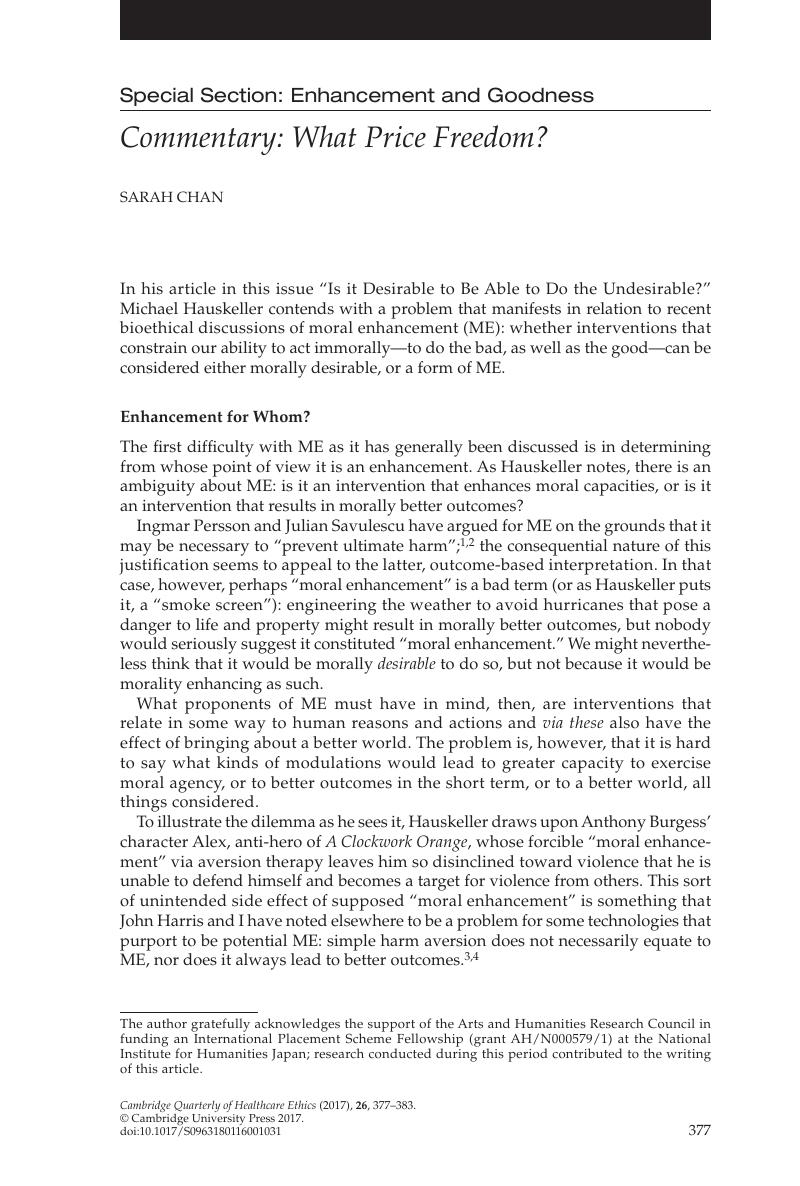No CrossRef data available.
Published online by Cambridge University Press: 25 May 2017

The author gratefully acknowledges the support of the Arts and Humanities Research Council in funding an International Placement Scheme Fellowship (grant AH/N000579/1) at the National Institute for Humanities Japan; research conducted during this period contributed to the writing of this article.
1. Persson, I, Savulescu, J. The perils of cognitive enhancement and the urgent imperative to enhance the moral character of humanity. Journal of Applied Philosophy 2008;25(3):162–77.CrossRefGoogle Scholar
2. Persson, I, Savulescu, J. Getting moral enhancement right: The desirability of moral bioenhancement. Bioethics 2013;27(3):124–31.CrossRefGoogle ScholarPubMed
3. Chan, S, Harris, J. Moral enhancement and pro-social behaviour. Journal of Medical Ethics 2011;37(3):130–1.CrossRefGoogle ScholarPubMed
4. Harris, J, Chan, S. Moral behavior is not what it seems. Proceedings of the National Academy of Sciences of the United States of America 2010;107(50):E183,CrossRefGoogle Scholar author reply at E4.
5. Harris, J. Moral enhancement and freedom. Bioethics 2011;25(2):102–11.CrossRefGoogle ScholarPubMed
6. Harris, J. Wicked or dead? Reflections on the moral character and existential status of God. In: Blackwell, R, Schüklenk, U, eds. 50 Voices of Disbelief: Why We Are Atheists. Oxford: Wiley Blackwell; 2009:33–41.CrossRefGoogle Scholar
7. For example, Harris, J. Enhancing Evolution. Princeton: Princeton University Press; 2007.Google Scholar
8. Sandel, M. The Case Against Perfection: Ethics in the Age of Genetic Engineering. Harvard: Harvard University Press; 2009.CrossRefGoogle Scholar
9. Warren, MA. On the moral and legal status of abortion. The Monist 1973;57(1):43–61, at 53.CrossRefGoogle ScholarPubMed
10. Tooley, M. Abortion and Infanticide. Philosophy and Public Affairs 1972;2(1):37–65.Google Scholar
11. Chan, S, Harris, J. Post-what? (And why does it matter?). In: Lippert-Rasmussen K, Thomsen MR, Wamberg J, eds. The Posthuman Condition: Ethics, Aesthetics and Politics of Biotechnological Challenges. Aarhus: Aarhus University Press; 2012:77–89.
12. See note 5, Harris 2011.
13. See note 5, Harris 2011.
14. Savulescu, J, Persson, I. Moral enhancement, freedom and the God machine. The Monist 2012;95(3):399–421.CrossRefGoogle ScholarPubMed
15. Douglas, T. Moral enhancement. Journal of Applied Philosophy 2008;25(3):228–45.CrossRefGoogle ScholarPubMed
16. DeGrazia, D. Moral enhancement, freedom, and what we (should) value in moral behaviour. Journal of Medical Ethics 2014;40(6):361–8.CrossRefGoogle ScholarPubMed
17. Savulescu and Persson make a similar point using the legend of Ulysses to illustrate how overriding a person’s present wishes can facilitate his long-term autonomy; see note 14, Savulescu, Persson 2012.